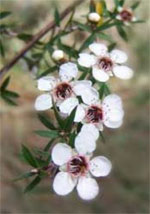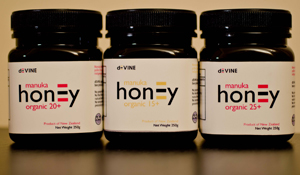A Rare Commodity
 Manuka flower
Manuka flower
Manuka Honey is produced by bees that gather pollen from the flowers of the Manuka tree, which is indigenous to New Zealand.
Medical Research
Dr Peter Molan, Associate Professor of Biochemistry at the University of Waikato, has proven the natural antibacterial properties of Active Manuka honey during a decade of research at the university’s Honey Research Unit.
In laboratory tests, Active Manuka Honey inhibited the growth of bacteria which causes many skin infections including antibiotic-resistant strains of bacteria such as MRSA and VRE. Recent clinical trials at Waikato Hospital, Hamilton, showed skin infections and wounds infected by “Golden staph” and other antibiotic-resistant bacteria responded well to Active Manuka Honey dressings.
Difference between standard honey and Active manuka honey
• Standard honey looses most of its healing properties when it comes in contact with wound fluids. Honey also has high sugar content which can actually promote the growth of bacteria.
• Manuka Honey has additional antibacterial properties that have the ability to destroy the bacteria that are responsible for infecting wounds.
• Manuka Honey is stable so there is no concern of it losing its potency or healing properties.
• Only Manuka Honey provides non-hydrogen peroxide antibacterial components.
• Manuka Honey’s antibacterial factor is unaffected by enzymes in the body that destroy hydrogen peroxide components.
• Manuka Honey is highly effective against antibiotic-resistant strains of bacteria.
• Manuka Honey maintains its potency even when diluted over 50 times, as will happen when used on the body.
• Manuka Honey is unaffected by heat or light. • Manuka Honey does not require moisture or oxygen to be effective. • Manuka Honey diffuses deep into skin tissue, making it possible to get
to affected areas.
Anti bacterial activity of Manuka
Most honeys are antibacterial in some respect. This antibacterial ability is mostly derived from Hydrogen Peroxide, which comes from an enzyme, added by the bee also known as Peroxide Activity.
Peroxide activity is delicate and unstable and can be easily destroyed by heat, light and water.
Total Active Manuka honey has another antiseptic agent that is much more robust than hydrogen peroxide and which can remain active against certain bacteria after being exposed to heat, light and water.
The special ‘Total Activity’- antibacterial property is not found in all manuka honey but in only a small percentage of manuka honey.
How is Manuka activity measured
Active Manuka Honey has been considered a remedy for many health conditions since ancient times. Manuka Honey is unique to New Zealand and contains non-peroxide antibacterial agents which can inhibit the growth of bacteria that cause slow healing wounds.
• The presence of this property can be detected only by laboratory testing. The Total Active rating indicates the antibacterial strength of the honey. Manuka Honey with a Manuka Activity level of 10 and above is endorsed by the Honey Research Unit at the University of Waikato, New Zealand. The higher the rating, the greater the antibacterial potency of the honey.
• Anything rated above ‘total Activity’ 10+ is a rare commodity and limited supply.
Manuka Honey Uses:
Based on recent studies, Manuka Honey has been known to be effective in providing relief against following symptoms and health conditions:
Internal Uses:
• Stomach Aches
• Stomach Ulcers
• Sore throat
• Strep throat
• Acid Reflux Disease
• Heartburn
• Peptic Ulcer
• H. pylori
• Gastritis
• Duodenal Ulcer
• Irritable Bowl Syndrome
• Gum Disease
• Ulcerative Colitis
• Diverticulitis
• Cold Sores
• Common Cold Symptoms
• Canker Sore
• Indigestion
• Cough
• Flu Symptoms
 Devine Products
Devine Products
Devine manuka honey products are sourced from a certified organic Apiary located in the remote and wild areas of South Island, New Zealand next to the National Park – PURE AND UNCONTAMINATED.
New Zealand has one of the strictest organic certification process requirements:
• No chemicals or drugs are allowed in or around the bees or their hives or in the materials used to construct their hives.
• All the land within the bees’ flying radius must be certified organic.
DEVINE PRODUCTS ARE 100% BEE PRODUCED
• The hives are never treated with any modern chemicals.
• The bees are not fed sugar or syrup to boost honey production.
• Do not use preservatives or artificial coloring
• No temperature higher than 39 degree Celsius is used during processing to retain the natural benefits and enzymes of the honey
• No fine filtering is applied making sure all the natural benefits in the honey like pollen, propolis and royal jelly are retain.
• Processed under a pollution -free environment of New Zealand
• Hold a Bio Organic certification endorsed by AsureQuality, New Zealand (IFOAM accredited) and New Zealand food safety authority
• Guaranteeing special anti-bacterial properties present in our manuka honey.

